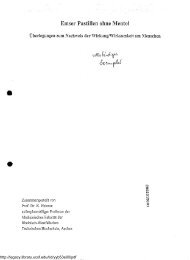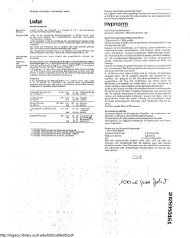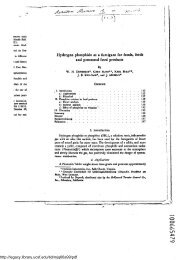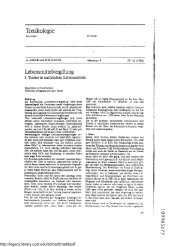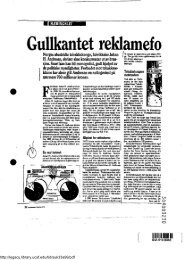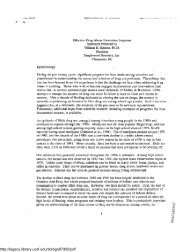How business, doctors and journalists prey on your food anxieties I
How business, doctors and journalists prey on your food anxieties I
How business, doctors and journalists prey on your food anxieties I
Create successful ePaper yourself
Turn your PDF publications into a flip-book with our unique Google optimized e-Paper software.
, I , ,I I ,,<br />
i<br />
I<br />
L<br />
Unbundling nati<strong>on</strong>s<br />
Steve H . Hanke is a<br />
professor of Appliad<br />
Ecclomics al<br />
TheJotns Hopkms<br />
On+ers:ty In Baltimnre .<br />
136<br />
hlArMatieas hace been srorking oscrtime to<br />
accommodate the inclusi<strong>on</strong> of 20 nc«countries<br />
in the past Five vears Most of thcse border<br />
adjustments ImN e resulted from the dismcmbermcnt<br />
of former communist countries . The<br />
bloodv events in Chechm°a <str<strong>on</strong>g>and</str<strong>on</strong>g> Bosnia indicate<br />
that the <strong>on</strong>bm,d!ing of the old cn :pire is far<br />
ti'om over<br />
. This trend is not limited to dze tormer communist<br />
countries, howcvcr . Political separatism<br />
is rampant in Canad-a, Mexico, India <str<strong>on</strong>g>and</str<strong>on</strong>g> _Afriean<br />
countries . Fcen Europe, which is struggling<br />
toward ec<strong>on</strong>omic integrati<strong>on</strong>, Itarbors str<strong>on</strong>g<br />
sep-aratistmoaements in Spain, Inile, Belgium<br />
<str<strong>on</strong>g>and</str<strong>on</strong>g> France .<br />
The driving force behind most separatist<br />
movemena is the dcsire or.' people to have a<br />
reas<strong>on</strong>ably homogenous populati<strong>on</strong> in their<br />
general neighborhoods . In mosr parts of the<br />
world, support for the "ntelting pot" is not<br />
very, popular . Political sentiments faworing homogeneitv<br />
ha% e alwavs been around . What's<br />
changed siuce the end of the Cold R'ar is the<br />
spread of democracq <str<strong>on</strong>g>and</str<strong>on</strong>g> e<strong>on</strong>sequentlr the<br />
freedom to express political preferences . More<br />
democt-acv is likclv to lead m more cotmtt-ies<br />
<str<strong>on</strong>g>and</str<strong>on</strong>g> smaller <strong>on</strong>es .<br />
It is sometimes said bv those %% ho embrace<br />
the social planning paradigm that smnll couc<br />
tries are disad%anmged . According to the social<br />
planners, large countries can spread [he<br />
costs ofpi.iblic goods-Iegal <str<strong>on</strong>g>and</str<strong>on</strong>g> m<strong>on</strong>etan,<br />
systems <str<strong>on</strong>g>and</str<strong>on</strong>g> the maintenance of nati<strong>on</strong>al defensc-over<br />
mam, taspayers . C<strong>on</strong>scyuetttlv,<br />
the average cost of these goods for cach taxpayer<br />
is lo«er in large countries, giring them an<br />
edge over small cormtt-ies . That's the theotv . In<br />
practice, howc%er, the ratio of e%oe~ditures<br />
<strong>on</strong> public goods to gross nati<strong>on</strong>al product is<br />
uncorrelated with the size of a couantq . When<br />
exposed to the light of da\, the ec<strong>on</strong>omies of<br />
scale argument just doesn't hold %caterOther critics of the small is beautiful n'end<br />
in nati<strong>on</strong>s claim that manv new states-such as<br />
the Baltic republics-are jus too smatl to be<br />
ec<strong>on</strong>omicallv viable . The evidcnce c<strong>on</strong>tradicts<br />
this asserti<strong>on</strong> . Historicallr- therc has been no<br />
re!ati<strong>on</strong> bcnwecn the growtlt or Ic\ cl of per capita<br />
inCOme <str<strong>on</strong>g>and</str<strong>on</strong>g> the SiZL' of a COUntR', sshether<br />
measured bv populatioti or area . Kenichi Ohmae's<br />
recent book, The Eraei or"the Nati<strong>on</strong><br />
Statr: The Rise af'Reftimtn! Ecnnamies, c<strong>on</strong>clodes<br />
that the fhture lies «'ith the small, t:ot the<br />
argc, countrics . The Japanese managen .en[<br />
guru supports his dicsis bv sho«ing that, in<br />
toda~-'s glohalized markets, the E,tstest-gros~ing<br />
counuries <str<strong>on</strong>g>and</str<strong>on</strong>g> regi<strong>on</strong>s arc actualhthe small<br />
<strong>on</strong>es that are open to internati<strong>on</strong>al trade .<br />
Another specious argument that is thrown<br />
up ugainst the estabiishment of small states is the<br />
claim that tltec cannot prosper because of inadequatenatural<br />
resource bases . This is nothing<br />
ntore than em•iror.mental detetminism, Nehich<br />
is dcarh~ \cr<strong>on</strong>glteaded . There is no relati<strong>on</strong>ship<br />
betrs'een ec<strong>on</strong>omic performance attd the presenee<br />
of natural resources %cithin a countn,'s borders<br />
. Indeed, thedsian tigers <str<strong>on</strong>g>and</str<strong>on</strong>g> the citvstate<br />
of Singapore hu% e been the most rapidhgroc<br />
.'iug ec<strong>on</strong>omics ocer the past 30 rears,<br />
<str<strong>on</strong>g>and</str<strong>on</strong>g> tlte%' d<strong>on</strong>'t hare much in d1e wav of natural<br />
resources . These ec<strong>on</strong>omies e slee., taze ~' _n ~ w'r t at<br />
the}' do well <str<strong>on</strong>g>and</str<strong>on</strong>g> then trade their goods for<br />
c<strong>on</strong>tmuditics .<br />
Prosperity doesn't ha~e much, ifanything,<br />
to do with a counttl's size . To promote prosperin',<br />
eren in countries with as fc%N as a milli<strong>on</strong><br />
inhabitants, the chicf ingredicnt is a good gocernmcnt<br />
drat maintains sound m<strong>on</strong>ev, the rule<br />
ofla«', open internati<strong>on</strong>al trade <str<strong>on</strong>g>and</str<strong>on</strong>g> avoicis market<br />
distorti<strong>on</strong>s such as escessis°e tax rates <str<strong>on</strong>g>and</str<strong>on</strong>g><br />
burdensome regulati<strong>on</strong>s . In sitort, it's stable,<br />
market-tiicndlp instituti<strong>on</strong>s that proride the<br />
necessartingrcdients for ec<strong>on</strong>omic growth .<br />
Thus it seems clear that the modern developments<br />
ofglobalizati<strong>on</strong> <str<strong>on</strong>g>and</str<strong>on</strong>g> democratizati<strong>on</strong><br />
are likeh, to lead to more counMes, not fewer .<br />
Some people think the<br />
proliferati<strong>on</strong> of new, small<br />
countries is a step backward .<br />
In fact it is a by-product of the<br />
spread of ec<strong>on</strong>omic <str<strong>on</strong>g>and</str<strong>on</strong>g><br />
political liberty .<br />
These brcakma~states are not throwbacks but a<br />
ware ofthe future, a bc-product of the spread<br />
of ec<strong>on</strong>omic <str<strong>on</strong>g>and</str<strong>on</strong>g> political libertt . But this<br />
thought is politically incorrect in America,<br />
where secessi<strong>on</strong> is a bad %lnrd . What else could<br />
explain Presidcnt George Bush's infan.ous<br />
"chicken I:ieN ~" address iu 1991 . in which he<br />
pledged allegiance to the presenuu<strong>on</strong> of the<br />
Soriet Uni<strong>on</strong> <str<strong>on</strong>g>and</str<strong>on</strong>g> lectured the Ukrainians <strong>on</strong><br />
the danger of "suicidal nati<strong>on</strong>alism"? No<br />
doubt President Clint<strong>on</strong>'s flip-flopping <strong>on</strong> Bosnia<br />
has been simiiarlv itttluenced by bad civics<br />
less<strong>on</strong>s too uell learned .<br />
Read the Declarati<strong>on</strong> ofIndependence .If<br />
secessi<strong>on</strong> kk as good for the col<strong>on</strong>ists in 1776,<br />
«ha is it had for Bosnians or Quebecois in<br />
1995 : M<br />
,: , . A _tKast1 4 .1995<br />
2046673394 rl,<br />
http://legacy.library.ucsf.edu/tid/agf97d00/pdf



